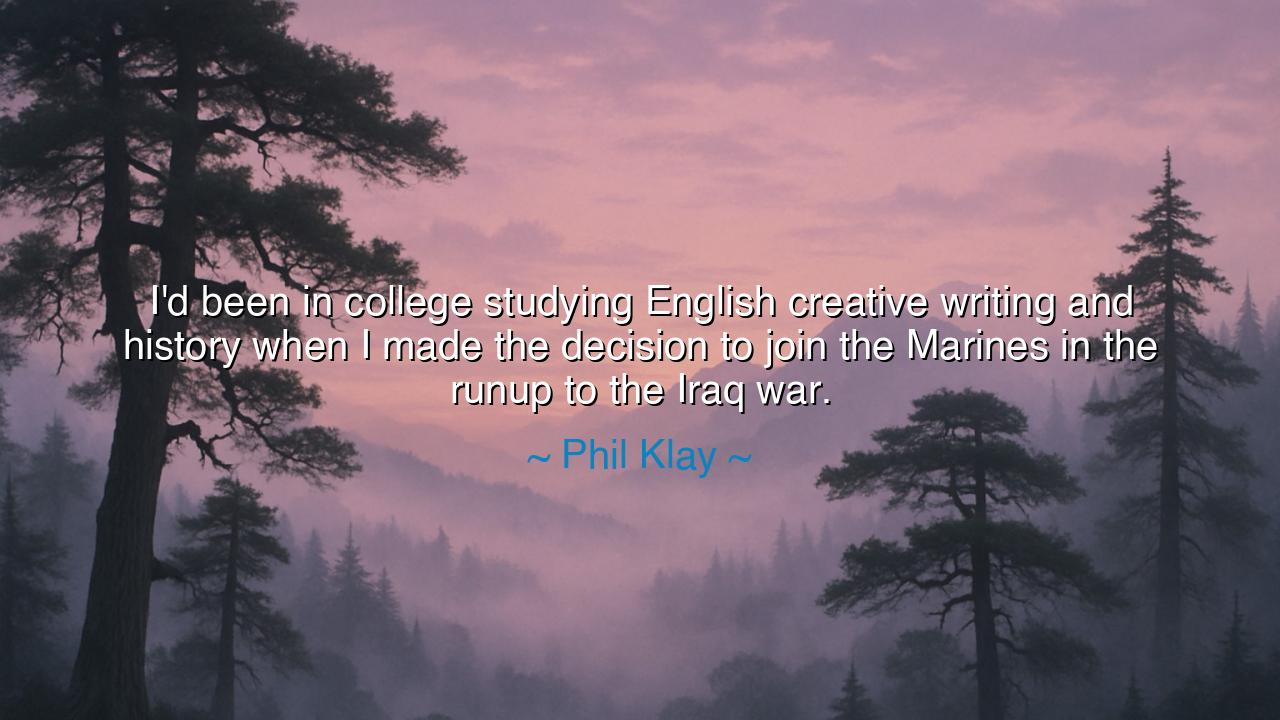
I'd been in college studying English creative writing and history
I'd been in college studying English creative writing and history when I made the decision to join the Marines in the runup to the Iraq war.






In a voice both reflective and resolute, Phil Klay, the soldier turned storyteller, once said: “I’d been in college studying English, creative writing, and history when I made the decision to join the Marines in the run-up to the Iraq War.” These words are not the boast of a warrior, nor the lament of one torn from peace, but the confession of a soul divided between thought and action, between the pen and the sword. In his sentence lies a deep and timeless struggle — that of the thinker who chooses to enter the world of deeds, and of the artist who steps into the realm of duty. Klay’s decision was not born of impulse, but of conviction: the recognition that wisdom, if it is to mean anything, must be tested by life itself.
When he speaks of his studies — English, creative writing, and history — Klay is describing more than the disciplines of the mind; he is naming the pillars of human understanding. Through literature he learned to imagine, through writing he learned to express, and through history he learned to remember. Yet what he sought next could not be found in books alone. In the classroom, he had encountered the stories of courage and tragedy written by others; in the field, he sought to live one of his own. Thus, his choice to join the Marines was not a rejection of art, but an expansion of it — a journey into the crucible of human experience, where theory dissolves into truth.
The origin of this quote lies in the early 2000s, when the Iraq War loomed and young men and women across the United States faced a question as old as civilization itself: What is one’s duty in times of conflict? For Klay, the decision was both intellectual and moral. The study of history had shown him that every era demands witnesses — those who not only act, but later speak for those who cannot. In enlisting, he accepted the cost of that witness. He would not merely observe history; he would enter it. And when his time in war was done, he would fulfill the writer’s sacred duty: to tell the truth of what he had seen.
In this, Klay followed a lineage of thinkers who chose the sword before returning to the pen. Consider Ernest Hemingway, who drove ambulances in the Great War before writing of the wounds it left behind, or Leo Tolstoy, who served in battle long before he wrote War and Peace. Each understood that human understanding is incomplete without the confrontation of life’s fiercest trials. Klay, too, recognized this — that to write of war with honesty, one must have stood in its shadow. His later works, such as Redeployment, carry this weight: not glorification, but truth — the voice of one who has walked through fire and returned to speak not of glory, but of complexity, grief, and the search for meaning.
Yet there is a deeper layer still. His choice to leave the safety of academia for the dangers of war embodies a principle that the ancients themselves revered: that the life of the mind and the life of action must be joined, or both wither. The philosopher must not become idle, nor the soldier unthinking. In uniting thought and deed, Phil Klay lived what Aristotle once taught — that virtue lies in balance, and that wisdom without courage is barren. He walked where ideas meet reality, and from that union came understanding that neither war nor writing alone could have given him.
This decision also reminds us of the paradox of service: that even the most peaceful hearts may find themselves called to conflict, not for conquest, but for conscience. In the run-up to war, Klay’s choice was not about politics, but about purpose. He sought to understand the nature of humanity — its darkness and its dignity — by facing it directly. Such a path demands sacrifice, but it also yields perspective. The soldier who has read deeply and the scholar who has lived deeply are both builders of wisdom, but together, they form the bridge between knowledge and compassion.
So, O seeker of truth, take from this story a lesson both solemn and strong: do not fear the union of thought and action. Whatever your calling, let your learning be tempered by experience, and your experience illuminated by reflection. The world needs not only thinkers who dream of justice, nor only warriors who act without reflection, but those rare souls who do both — who live as students of life and servants of humanity. Phil Klay’s journey shows that courage is not only found on the battlefield, but also in the choice to engage fully with life — to live it, to understand it, and finally, to give it voice.
Thus, remember his example: knowledge must not be kept safe in the ivory towers of the mind. It must descend into the dust and turmoil of the world, there to be tested, purified, and made true. For it is only when the writer dares to live, and the soldier dares to think, that the two halves of wisdom — understanding and action — become one. And from that union comes the kind of truth that endures long after the noise of war has faded, a truth written not merely in words, but in the human soul itself.






AAdministratorAdministrator
Welcome, honored guests. Please leave a comment, we will respond soon